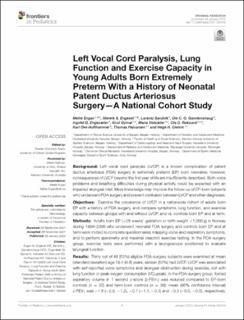| dc.contributor.author | Engan, Mette | |
| dc.contributor.author | Engeset, Merete Salveson | |
| dc.contributor.author | Sandvik, Lorentz | |
| dc.contributor.author | Gamlemshaug, Ole C.O. | |
| dc.contributor.author | Engesæter, Ingvild Øvstebø | |
| dc.contributor.author | Øymar, Knut Asbjørn Alexander | |
| dc.contributor.author | Vollsæter, Maria | |
| dc.contributor.author | Røksund, Ola Drange | |
| dc.contributor.author | Hufthammer, Karl Ove | |
| dc.contributor.author | Halvorsen, Thomas | |
| dc.contributor.author | Clemm, Hege Synnøve Havstad | |
| dc.date.accessioned | 2022-06-02T10:51:10Z | |
| dc.date.available | 2022-06-02T10:51:10Z | |
| dc.date.created | 2022-02-02T11:16:52Z | |
| dc.date.issued | 2022 | |
| dc.identifier.citation | Engan, M., Engeset, M. S., Sandvik, L., Gamlemshaug, O. C. O., Engesæter, I. Ø., Øymar, K., Vollsæter, M., Røksund, O. D., Hufthammer, K. O., Halvorsen, T., & Clemm, H. H. (2022). Left vocal cord paralysis, lung function and exercise capacity in young adults born extremely preterm with a history of neonatal patent ductus arteriosus surgery: A national cohort study. Frontiers in Pediatrics, 9. | en_US |
| dc.identifier.issn | 2296-2360 | |
| dc.identifier.uri | https://hdl.handle.net/11250/2997359 | |
| dc.description.abstract | Background: Left vocal cord paralysis (LVCP) is a known complication of patent ductus arteriosus (PDA) surgery in extremely preterm (EP) born neonates; however, consequences of LVCP beyond the first year of life are insufficiently described. Both voice problems and breathing difficulties during physical activity could be expected with an impaired laryngeal inlet. More knowledge may improve the follow-up of EP-born subjects who underwent PDA surgery and prevent confusion between LVCP and other diagnoses.
Objectives: Examine the prevalence of LVCP in a nationwide cohort of adults born EP with a history of PDA surgery, and compare symptoms, lung function, and exercise capacity between groups with and without LVCP, and vs. controls born EP and at term.
Methods: Adults born EP (<28 weeks' gestation or birth weight <1,000 g) in Norway during 1999–2000 who underwent neonatal PDA surgery and controls born EP and at term were invited to complete questionnaires mapping voice-and respiratory symptoms, and to perform spirometry and maximal treadmill exercise testing. In the PDA-surgery group, exercise tests were performed with a laryngoscope positioned to evaluate laryngeal function.
Results: Thirty out of 48 (63%) eligible PDA-surgery subjects were examined at mean (standard deviation) age 19.4 (0.8) years, sixteen (53%) had LVCP. LVCP was associated with self-reported voice symptoms and laryngeal obstruction during exercise, not with lung function or peak oxygen consumption (VO2peak). In the PDA-surgery group, forced expiratory volume in 1 second z-score (z-FEV1) was reduced compared to EP-born controls (n = 30) and term-born controls (n = 36); mean (95% confidence interval) z-FEV1 was −1.8 (−2.3, −1.2), −0.7 (−1.1, −0.3) and −0.3 (−0.5, −0.0), respectively. For VO2peak, corresponding figures were 37.5 (34.9, 40.2), 38.1 (35.1, 41.1), and 43.6 (41.0, 46.5) ml/kg/min, respectively.
Conclusions: LVCP was common in EP-born young adults who had undergone neonatal PDA surgery. Within the PDA-surgery group, LVCP was associated with self-reported voice symptoms and laryngeal obstruction during exercise, however we did not find an association with lung function or exercise capacity. Overall, the PDA-surgery group had reduced lung function compared to EP-born and term-born controls, whereas exercise capacity was similarly reduced for both the PDA-surgery and EP-born control groups when compared to term-born controls. | en_US |
| dc.language.iso | eng | en_US |
| dc.publisher | Frontiers Media S.A. | en_US |
| dc.rights | Navngivelse 4.0 Internasjonal | * |
| dc.rights.uri | http://creativecommons.org/licenses/by/4.0/deed.no | * |
| dc.subject | infant: extremely premature | en_US |
| dc.subject | infant: extremely low birth weight | en_US |
| dc.subject | vocal cord paralysis | en_US |
| dc.subject | cohort studies | en_US |
| dc.subject | patent ductus arteriosus | en_US |
| dc.subject | ligation | en_US |
| dc.subject | bronchopulmonary dysplasia | en_US |
| dc.subject | exercise test | en_US |
| dc.title | Left vocal cord paralysis, lung function and exercise capacity in young adults born extremely preterm with a history of neonatal patent ductus arteriosus surgery—A national cohort study | en_US |
| dc.type | Peer reviewed | en_US |
| dc.type | Journal article | en_US |
| dc.description.version | publishedVersion | en_US |
| dc.rights.holder | © 2022 Engan, Engeset, Sandvik, Gamlemshaug, Engesæter, Øymar, Vollsæter, Røksund, Hufthammer, Halvorsen and Clemm | en_US |
| dc.source.pagenumber | 1-13 | en_US |
| dc.source.volume | 9 | en_US |
| dc.source.journal | Frontiers in pediatrics | en_US |
| dc.identifier.doi | 10.3389/fped.2021.780045 | |
| dc.identifier.cristin | 1996866 | |
| cristin.ispublished | true | |
| cristin.fulltext | original | |
| cristin.qualitycode | 1 | |

